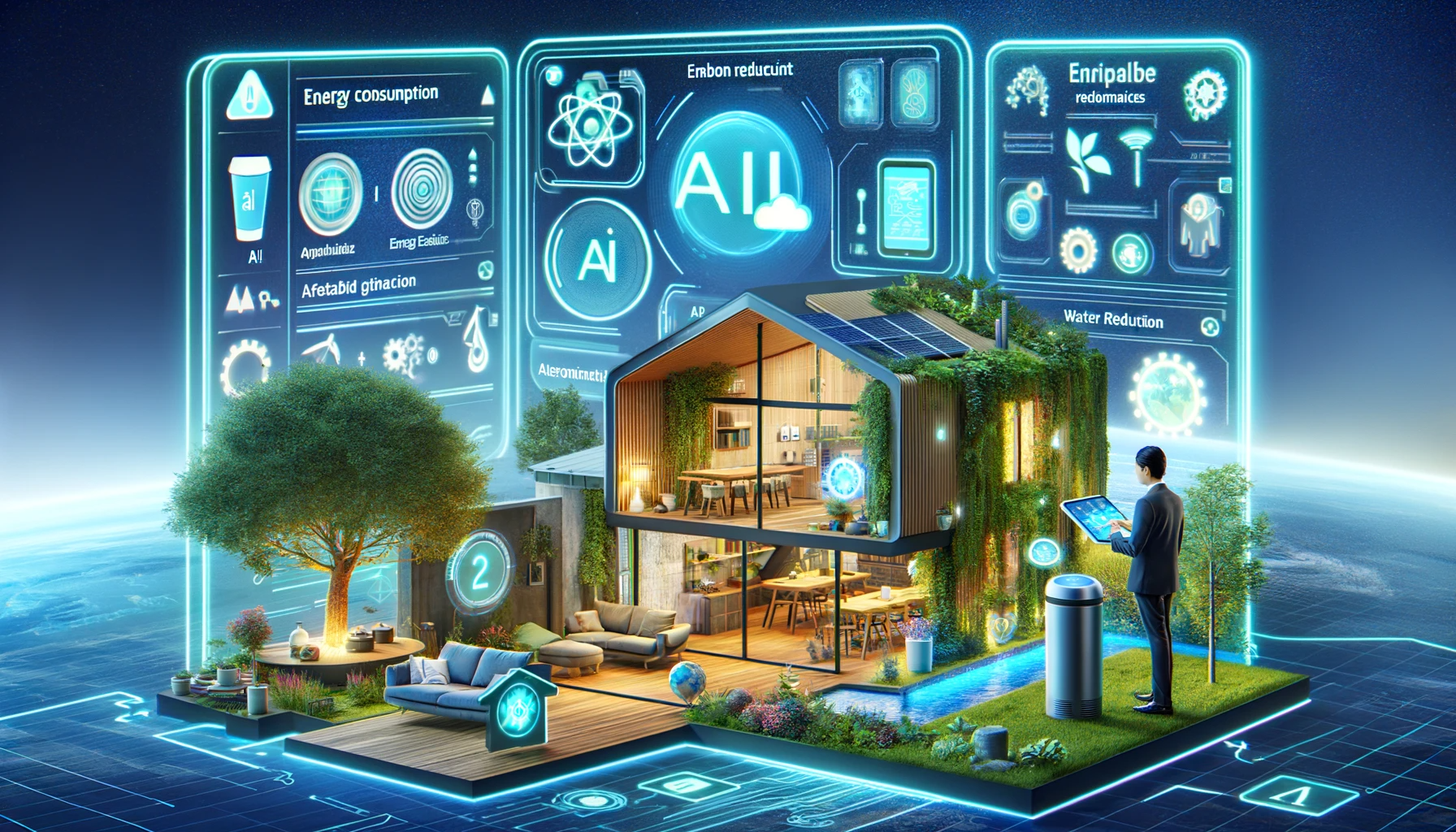In today’s world, sustainability has become a paramount concern, with individuals and businesses striving to reduce their ecological footprint and contribute to a greener future. As climate change, resource depletion, and environmental degradation pose significant challenges, the role of artificial intelligence (AI) in addressing these issues has gained prominence. This article explores how AI is transforming sustainable living by providing personalized recommendations and solutions tailored to individuals’ unique lifestyles and preferences.
The urgency of addressing sustainability issues cannot be overstated. Climate change’s impact is increasingly visible, with extreme weather events, rising sea levels, and disruptions to ecosystems affecting communities worldwide. Sustainable living involves adopting practices that minimize harm to the planet while promoting a higher quality of life. AI has emerged as a powerful tool in this endeavor, enabling individuals to make informed, eco-conscious choices effortlessly.
The Power of AI in Sustainable Living
AI has made remarkable strides in recent years, fundamentally changing the way we interact with technology and information. Its potential in the realm of sustainability is immense. With its ability to process vast amounts of data, recognize patterns, and provide real-time insights, AI has the power to revolutionize sustainable living. It offers solutions that extend beyond one-size-fits-all approaches, taking into account individual preferences, behaviors, and needs.
AI’s impact on sustainability extends across various domains. From energy-efficient smart homes to eco-conscious transportation and sustainable consumer choices, AI is reshaping the landscape of sustainable living. This technology is helping individuals, businesses, and communities make informed decisions that align with their sustainability goals, ultimately contributing to a more environmentally friendly and socially responsible world.
Personalized Recommendations in Sustainable Living
At the heart of AI’s influence on sustainable living lies personalized recommendations. These recommendations leverage the capabilities of AI, such as machine learning and data analysis, to provide tailored guidance to individuals seeking sustainable solutions. Instead of generic advice, personalized recommendations take into account an individual’s lifestyle, location, preferences, and behaviors, ensuring that the suggestions resonate with the person’s unique circumstances.
Imagine receiving recommendations for sustainable practices, products, and services that align with your daily routines and personal values. Whether you’re interested in reducing energy consumption, adopting a plant-based diet, or minimizing waste, AI can offer insights and guidance specific to your goals. These recommendations empower individuals to make meaningful changes in their lives that promote sustainability while accommodating their individual needs.
Personalized recommendations also extend beyond the individual level. AI-driven platforms and apps provide communities with tailored sustainability strategies, allowing regions to address local environmental challenges effectively. This level of customization encourages collective efforts toward a greener, more sustainable future.
In the next sections, we will delve deeper into the mechanics of personalized recommendations, exploring how AI processes data and offers actionable insights. We will also showcase real-world examples of AI applications in sustainable living, illustrating the transformative potential of this technology.

How AI Generates Personalized Recommendations
The effectiveness of AI in sustainable living recommendations hinges on its ability to process vast datasets and generate insights tailored to individual users. AI-driven platforms employ machine learning algorithms to analyze user data, including behavior, preferences, location, and historical choices. Here’s how it works:
- Data Collection: AI gathers data from various sources, such as user interactions with apps, devices, and websites. This includes information on energy consumption, transportation choices, shopping habits, and more. The data collection process can be passive (e.g., tracking user behavior) or active (e.g., users inputting their preferences).
- Data Analysis: Once collected, the data undergoes sophisticated analysis. Machine learning algorithms identify patterns, correlations, and trends within the data. For example, AI can recognize when and where a user consumes the most energy or the types of sustainable products they tend to purchase.
- Personalization: AI uses the insights gained from data analysis to create personalized recommendations. It takes into account the user’s unique profile, including their goals, values, and constraints. These recommendations can cover a wide range of sustainable practices, such as reducing energy usage, conserving water, recycling, and supporting eco-friendly brands.
- Continuous Learning: AI systems continuously learn and adapt as users interact with the recommendations. Feedback loops enable the algorithms to refine their suggestions over time, ensuring that the advice remains relevant and effective.
Real-World Applications of AI in Sustainable Living
AI’s impact on sustainable living is not confined to theory; it has tangible applications in various aspects of daily life. Here are some real-world examples:
- Smart Homes: AI-powered home automation systems can optimize energy usage by adjusting lighting, heating, and cooling based on occupancy and weather conditions. They can also provide real-time feedback on energy consumption and suggest ways to reduce it.
- Sustainable Transportation: Ride-sharing platforms use AI to optimize routes, reducing fuel consumption and emissions. Electric and autonomous vehicles are becoming more prevalent, further contributing to sustainable transportation.
- Eco-Friendly Shopping: AI-driven apps help consumers make sustainable choices by offering product recommendations based on eco-labels, ingredients, and brand ethics. They can also track a product’s environmental impact throughout its lifecycle.
- Waste Reduction: AI-powered waste management systems optimize collection routes, reducing fuel consumption and emissions. Smart bins can notify authorities when they need emptying, preventing overflowing bins and littering.
Challenges and Ethical Considerations
While AI holds promise in sustainable living, it also presents challenges and ethical considerations. Some of the key concerns include:
- Privacy: Collecting and analyzing user data for personalized recommendations can raise privacy concerns. Striking a balance between personalization and data protection is crucial.
- Bias: AI algorithms can inadvertently perpetuate bias if they are trained on biased datasets. Ensuring fairness and equity in recommendations is an ongoing challenge.
- Accessibility: AI-driven solutions may not be accessible to everyone, potentially exacerbating inequalities in sustainable living.
- Transparency: Users often want to understand how AI generates recommendations. Ensuring transparency in AI systems is essential for building trust.
The Future of Sustainable Living with AI
The future of sustainable living with AI is promising. As technology advances and AI becomes more integrated into daily life, we can expect:
- Increased Adoption: AI-driven sustainable living solutions will become more widespread and accessible, enabling more people to reduce their environmental footprint.
- Greater Personalization: AI will continue to improve its ability to provide highly personalized recommendations, making sustainable living more convenient and attractive.
- Ecosystem-Level Impact: AI will play a significant role in optimizing entire ecosystems, such as smart cities that maximize sustainability across transportation, energy, waste management, and more.
- Innovation: AI will drive innovation in sustainable technologies, fostering the development of new products and services that align with ecological goals.

Embracing AI for a Sustainable Future
As we navigate the challenges of an increasingly interconnected and environmentally conscious world, the role of artificial intelligence (AI) in shaping personalized recommendations for sustainable living cannot be overstated. AI has emerged as a powerful ally in our collective efforts to reduce our carbon footprint, conserve resources, and promote eco-friendly practices.
In this article, we delved into the intricate workings of AI-driven personalized recommendations, from data collection and analysis to the creation of tailored suggestions. We explored real-world applications across various facets of sustainable living, showcasing how AI is making a tangible impact in smart homes, transportation, shopping, waste management, and more.
However, it is important to recognize that the integration of AI into sustainable living is not without its challenges and ethical considerations. Privacy concerns, bias in algorithms, accessibility, and transparency are ongoing issues that require careful attention and regulation to ensure that AI benefits all segments of society.
Looking ahead, the future of sustainable living with AI is indeed promising. We can anticipate a wider adoption of AI-driven solutions, bringing sustainable practices within reach of a broader population. Personalization will continue to evolve, making eco-friendly choices more attractive and convenient for individuals. Moreover, AI’s influence will extend beyond individual recommendations to optimizing entire ecosystems, such as smart cities, for maximal sustainability.
Perhaps most excitingly, AI will serve as a catalyst for innovation, driving the development of new, sustainable technologies and solutions that align with our ecological goals. The synergy between AI and sustainable living promises a greener, more harmonious world—a world where each individual’s choices contribute to a brighter, more sustainable future for all.
In conclusion, as AI continues to shape the future of personalized recommendations for sustainable living, our shared responsibility is to harness this technology for the benefit of our planet and future generations. By working together to address challenges and promote ethical AI practices, we can pave the way towards a more sustainable and environmentally conscious world.
